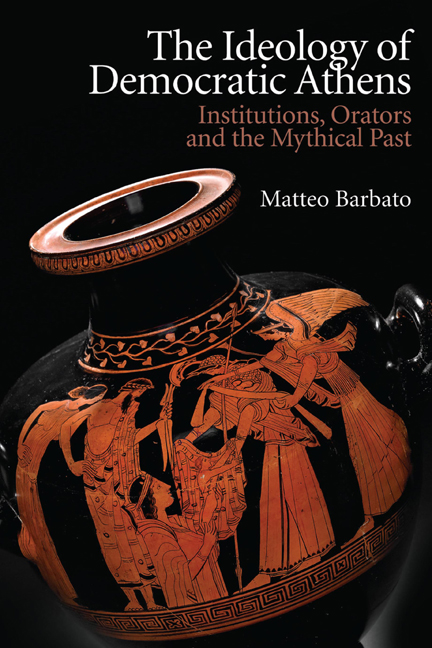Book contents
- Frontmatter
- Contents
- List of Tables and Illustrations
- Preface
- Abbreviations
- 1 Introduction
- 2 Myth and Athenian Democracy
- 3 The Discursive Parameters of Athenian Democratic Institutions
- 4 Exclusiveness and Eugeneia in the Myth of Autochthony
- 5 Between Charis and Philanthrōpia: The Heraclidae
- 6 Fading Shades of Hybris: The Attic Amazonomachy
- 7 Combining Hybris and Philanthrōpia: The Myth of Adrastus
- 8 Conclusions
- Bibliography
- Index Locorum
- General Index
5 - Between Charis and Philanthrōpia: The Heraclidae
Published online by Cambridge University Press: 17 October 2020
- Frontmatter
- Contents
- List of Tables and Illustrations
- Preface
- Abbreviations
- 1 Introduction
- 2 Myth and Athenian Democracy
- 3 The Discursive Parameters of Athenian Democratic Institutions
- 4 Exclusiveness and Eugeneia in the Myth of Autochthony
- 5 Between Charis and Philanthrōpia: The Heraclidae
- 6 Fading Shades of Hybris: The Attic Amazonomachy
- 7 Combining Hybris and Philanthrōpia: The Myth of Adrastus
- 8 Conclusions
- Bibliography
- Index Locorum
- General Index
Summary
The story of how Athens protected the Heraclidae against Eurystheus held a special place in Athenian social memory. This is to some extent surprising, given the strong Peloponnesian connotations of Heracles and his children. The return of the Heraclidae was at the core of Sparta's foundation narrative. The belief that the Spartan kings were the descendants of the Heraclidae can be traced back at least to the seventh century, when it featured in the poems of Tyrtaeus (Tyrtaeus frr. 2.12–15; 11.1; 19.8 West). Heracles, however, figured prominently in Attic pottery of the sixth century. Heracles’ fight against Nereus and his introduction to Olympus were particularly popular scenes, and the hero's incidence in Athenian architectural sculpture of the same period is remarkable compared with the rest of Greece. The vases depicting Heracles’ introduction to Olympus, which usually show Athena riding a chariot together with the hero, are especially interesting. The scene has been linked with Pisistratus’ second rise to power. On that occasion, if we believe Herodotus and the Aristotelian Constitution of the Athenians, the future tyrant entered Athens on a golden chariot accompanied by a woman who posed as Athena (Hdt. 1.60; [Arist.] Ath. Pol. 14.4). This led John Boardman to postulate that the vases reflect the political use of Heracles on the part of Pisistratus, who fostered the idea of his own identification with the hero.
The Spartans’ claim to descend from Heracles, which stems from the myth of the return of the Heraclidae, made its first appearance in Athens at the end of the sixth century in the aftermath of the fall of the Pisistratids. Herodotus recounts how the Spartan king Cleomenes, when trying to impose Isagoras as Athens’ ruler, had not been allowed in the temple of Athena on the Acropolis. To the priestess of Athena who accused him of being a Dorian, Cleomenes protested his Achaean ancestry (Hdt. 5.72.3). Cleomenes therefore tried to gain access to the shrine by downplaying the Dorian ancestry of the Spartans as a whole and emphasising the Heraclid ancestry of Sparta's royal families. Herodotus says nothing about the priestess’ reply to Cleomenes, but the fact that she was unaware of the king's Achaean roots is in itself significant.
- Type
- Chapter
- Information
- The Ideology of Democratic AthensInstitutions, Orators and the Mythical Past, pp. 115 - 143Publisher: Edinburgh University PressPrint publication year: 2020



